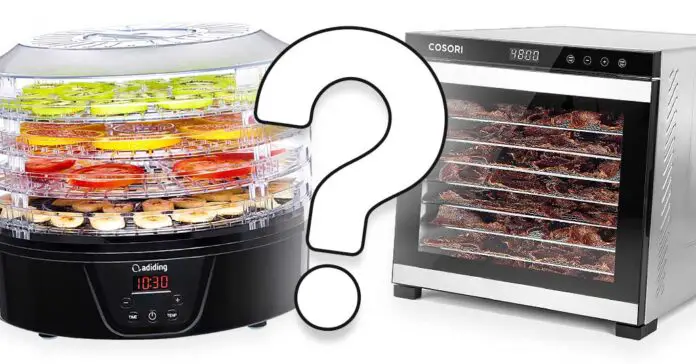Are food dehydrators worth the investment? Discover the benefits of food dehydrators, their best uses, how to choose the right one, as well as some neat tips for storing dehydrated foods. Find out if they’re worth the investment in our comprehensive and straight to the point guide!
- Why Would You Need a Food Dehydrator?
- Best Uses For a Food Dehydrator
- How To Choose The Best Food Dehydrator
- Tips for Properly Storing Dehydrated Foods for Maximum Freshness
- Common Mistakes to Avoid When Using a Food Dehydrator
- Are Food Dehydrators Worth Buying? – The Grand Summary
This web portal is supported by its readers, and is a part of the Amazon Services LLC Associates Program and the eBay Partner Network. When you buy using links on our site, we may earn an affiliate commission!
See also: Are Air Fryers An Overrated Gimmick? – An Honest Opinion
Why Would You Need a Food Dehydrator?
A food dehydrator is a versatile kitchen appliance that can be a valuable addition to your culinary arsenal. It works by removing moisture from food, which helps to preserve it for extended periods and completely changes its texture and taste qualities.
Here are some reasons why you might need a food dehydrator in your kitchen, and things this appliance is actually good for:
- Preserving seasonal produce: Dehydrating fruits and vegetables during their peak season allows you to enjoy their flavors and nutrients all year round.
- Reducing food waste: Dehydrating food in advance can prevent it from spoiling too fast and in turn help you save money and reduce food waste.
- Creating healthy snacks: Dehydrated fruits, vegetables, and meats make for quick nutritious and portable snacks. Perfect addition to work, university and college on-the-go meals!
- Enhancing flavors: The dehydration process can intensify the flavors of certain foods, making them even more delicious.
- Camping food and emergency food: Dehydrated foods are lightweight and have a long shelf life, making them ideal for camping trips. You can also use most dehydrated foods in your emergency food supplies because of their longevity.
Read on for much more great uses for this little inconspicuous piece of kitchen equipment.
Best Uses For a Food Dehydrator
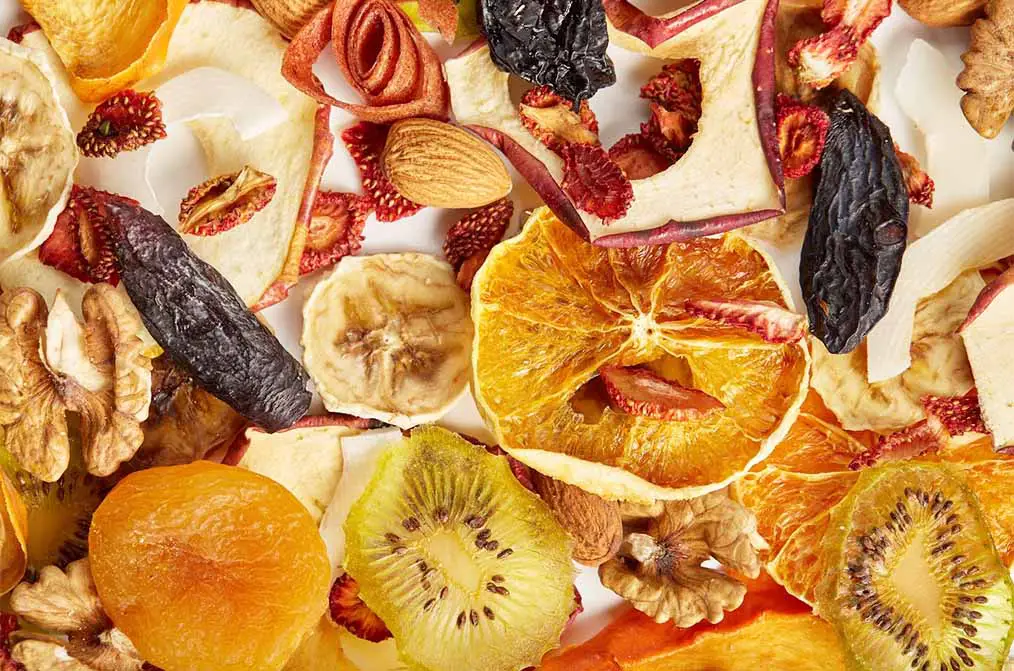
A food dehydrator can be a great choice for your next kitchen appliance. The main reasons for that being it has so much more uses than simply dehydrating fruit or veggies.
Here are some of the best uses for a food dehydrator:
- Dehydrating Fruits: Dehydrate fruits like apples, bananas, and strawberries for a healthy, sweet and portable snack.
- Dehydrating Vegetables: Preserve the nutrients in vegetables like kale, spinach, and zucchini by dehydrating them.
- Dehydrating Herbs: Dry herbs like basil, parsley, and rosemary to extend their shelf life and enhance their flavors. Also helpful if you want to use the herbs for anything other like brews or teas.
- Making Homemade Jerky: Make your own beef, turkey, or even fish jerky by marinating the meat and then dehydrating it. Homemade jerky can be healthier and much more cost-effective than store-bought varieties.
- Making Granola: Create homemade granola with your favorite nuts, seeds, and dried fruits.
- Preparing Fruit Leather Snacks: Blend fruit purees and dehydrate them to make a tasty, chewy snack.
- Making DIY Crackers: Make your own healthy crackers from seeds, nuts, and grains.
- Producing Quality Pet Treats: Dehydrate meats and vegetables to create great quality treats for your animal friends.
- Making Potpourri Mixes: Dry flowers, herbs, and fruit peels to create your own potpourri mixtures for a natural and fragrant home scent.
These are just a few examples of the many possibilities a food dehydrator offers. As you can see, a food dehydrator offers a wide range of possibilities, some even going beyond simply preserving food.
How To Choose The Best Food Dehydrator
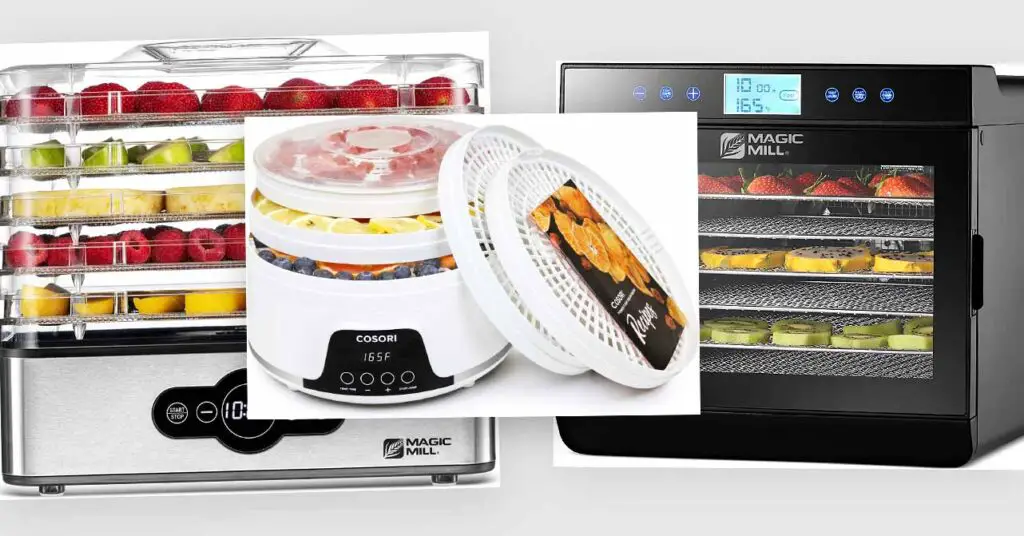
When it comes to selecting the best food dehydrator, there are several factors to consider. Here’s a list of key aspects to help you out:
- Size and Capacity: Consider the available space in your kitchen and the amount of food you plan to dehydrate. Choose a dehydrator with enough trays to accommodate your needs.
- Temperature Range: Opt for a dehydrator with a wide temperature range, typically between around 95°F to 165°F (around 35°C to 72°C), to be able to use it with various different types of food.
- Adjustable Thermostat: An adjustable thermostat allows you to set the precise temperature for each type of food, ensuring optimal dehydration. Most if not all modern dehydrators feature that.
- Timer: A built-in timer can be a convenient feature, allowing you to take the convenient set-and-forget approach while dehydrating your food products.
- Noise Level: Some older food dehydrators can get quite noisy. If noise is a concern, look for a model with a guarantee of quiet operation.
- Material: Dehydrators are typically made of plastic or plastic/metal material mix. While full-plastic models are often more affordable, more sturdy dehydrators with stainless steel chassis elements can get more durable and in general look better.
- Price: Determine your budget and compare the features of different models within your price range to find the best value. Dehydrators with more capacity and more extra features can get expensive.
By considering these factors, you can find the perfect food dehydrator for your needs and start enjoying the benefits of dehydrated foods.
And so, taking all these things into consideration, here are the exact dehydrators we recommend you check out:
| Photo: | Model: | Description: | The price: |
|---|---|---|---|
| | COSORI Food Dehydrator (Large Capacity) | One of the largest options from COSORI – packed with features, capacious and reliable. | – See on Amazon – See on Ebay |
| COSORI Food Dehydrator (Medium Capacity) | A smaller equivalent, cheaper yet still retaining the same build quality. | – See on Amazon – See on Ebay | |
| Magic Mill Food Dehydrator | A cheaper and much smaller option for those who want to slowly try their hand at dehydrating food without breaking the bank. | – See on Amazon – See on Ebay |
Tips for Properly Storing Dehydrated Foods for Maximum Freshness
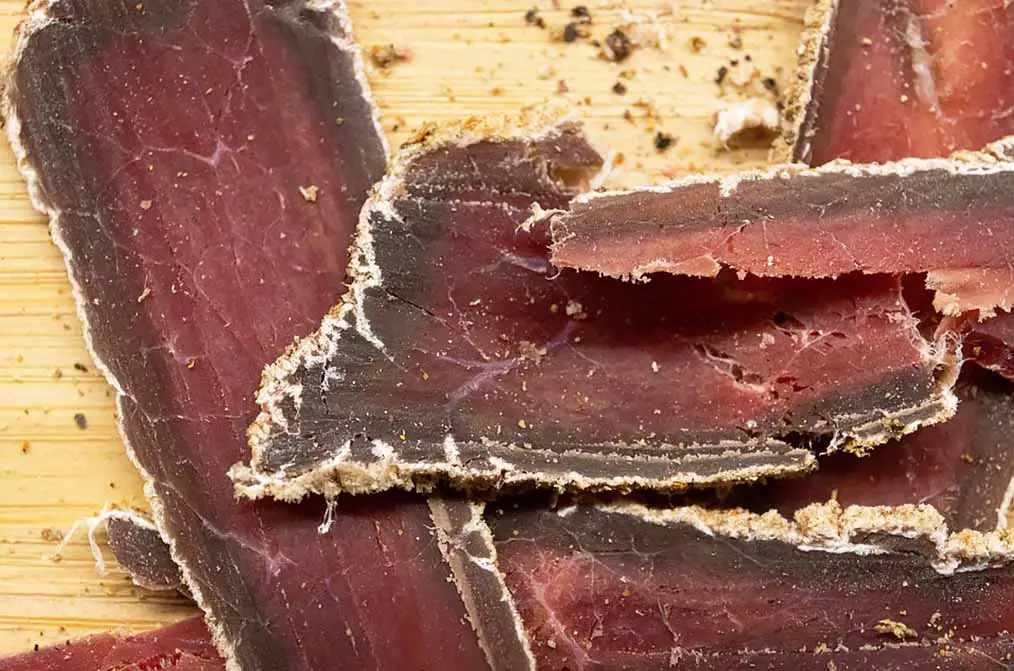
To ensure that your dehydrated foods stay fresh and flavorful for as long as possible, follow these essential storage tips:
- Use airtight containers: Store dehydrated foods in airtight containers such as glass jars, plastic containers, or vacuum-sealed bags. This will help prevent moisture from re-entering the food partially and causing premature spoilage.
- Keep containers in a cool, dark place: Exposure to heat, light, and humidity can shorten the shelf life of dehydrated foods. Store your containers in a cool, dark place like a pantry or cupboard. Dehydrated food does not need to be refrigerated.
- Label and date your containers: To keep track of how long your dehydrated foods have been stored, always label and date your containers. This will help you know when it’s time to use or discard them.
- Rotate your stock: Practice the “first in, first out” rule by using the oldest dehydrated foods first and adding new batches to the back of your storage area.
By following these tips, you can enjoy the maximum freshness and flavor of your dehydrated foods for months or even years to come.
Common Mistakes to Avoid When Using a Food Dehydrator
When using a food dehydrator, it’s important to avoid common mistakes that can lead to less-than-ideal results. Here are some pitfalls to watch out for:
- Overloading the trays: Giving your food enough space to dry properly is crucial. Overcrowding the trays can result in uneven drying and longer drying times.
- Using the wrong temperature: Different foods require different temperatures for optimal dehydration. Be sure to consult your dehydrator’s manual or a reliable guide for the appropriate temperature settings for each type of food you want to dehydrate.
- Ignoring the humidity in your environment: High humidity can affect the drying process. If you live in a humid area, you may need to adjust the drying time or temperature to compensate.
- Not cutting food into uniform pieces: To ensure even drying, it’s important to cut food into similar-sized pieces. This will help to prevent some pieces from drying too quickly while others remain under-dried.
- Not checking on the food regularly: Dehydration times can vary depending on various factors. Be sure to check on your food periodically to ensure it’s drying properly and to prevent over-drying.
By avoiding these common mistakes, you can ensure that your food dehydrator delivers the best possible results every time.
Are Food Dehydrators Worth Buying? – The Grand Summary
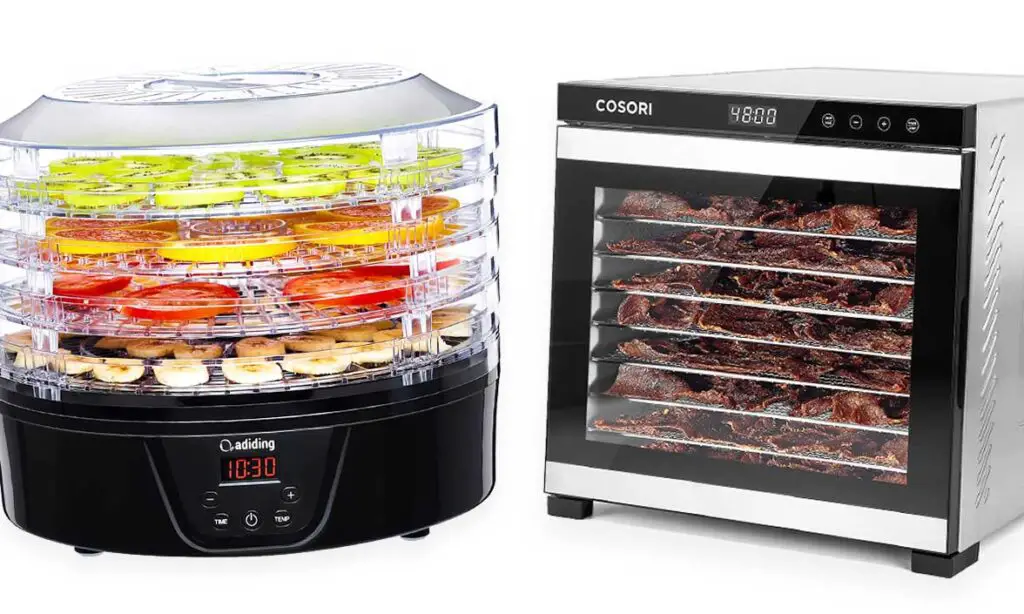
After exploring the various aspects of food dehydrators, let’s summarize our findings to answer the big question: In the end, are food dehydrators worth buying? Here are some pros and cons of owning a dehydrator, based on our experience.
Pros:
- It will help you preserve food for extended periods, reducing waste.
- You’ll be able to enhance flavors of certain foods and create unique textured snacks.
- Owning a dehydrator can help you promote healthier eating by reducing reliance on heavily processed snacks.
- In the end, food dehydrators are very versatile kitchen appliances with a pretty wide range of different applications.
Cons:
- A dehydrator will take up additional space in your kitchen.
- It requires quite some time to properly dehydrate some food products so in some cases you’ll have to plan out the dehydration hours/process beforehand.
In conclusion, if you’re someone who values long-term food preservation, enjoys experimenting with flavors and textures, and wants to lead a healthier lifestyle, then a food dehydrator can be a worthy investment. However, if you have limited kitchen space, a tight budget, or don’t see yourself using it frequently, it may not be the best fit for you. We hope we were able to help you!
You might also like: Cheese Gift Baskets – All You Need To Know (Best Cheese Boxes)


